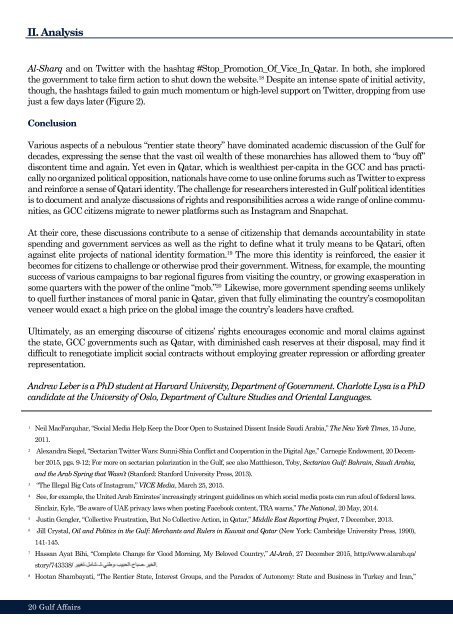You also want an ePaper? Increase the reach of your titles
YUMPU automatically turns print PDFs into web optimized ePapers that Google loves.
II. Analysis<br />
Al-Sharq and on Twitter with the hashtag #Stop_Promotion_Of_Vice_In_Qatar. In both, she implored<br />
the government to take firm action to shut down the website. 18 Despite an intense spate of initial activity,<br />
though, the hashtags failed to gain much momentum or high-level support on Twitter, dropping from use<br />
just a few days later (Figure 2).<br />
Conclusion<br />
Various aspects of a nebulous “rentier state theory” have dominated academic discussion of the Gulf for<br />
decades, expressing the sense that the vast oil wealth of these monarchies has allowed them to “buy off”<br />
discontent time and again. Yet even in Qatar, which is wealthiest per-capita in the GCC and has practically<br />
no organized political opposition, nationals have come to use online forums such as Twitter to express<br />
and reinforce a sense of Qatari identity. The challenge for researchers interested in Gulf political identities<br />
is to document and analyze discussions of rights and responsibilities across a wide range of online communities,<br />
as GCC citizens migrate to newer platforms such as Instagram and Snapchat.<br />
At their core, these discussions contribute to a sense of citizenship that demands accountability in state<br />
spending and government services as well as the right to define what it truly means to be Qatari, often<br />
against elite projects of national identity formation. 19 The more this identity is reinforced, the easier it<br />
becomes for citizens to challenge or otherwise prod their government. Witness, for example, the mounting<br />
success of various campaigns to bar regional figures from visiting the country, or growing exasperation in<br />
some quarters with the power of the online “mob.” 20 Likewise, more government spending seems unlikely<br />
to quell further instances of moral panic in Qatar, given that fully eliminating the country’s cosmopolitan<br />
veneer would exact a high price on the global image the country’s leaders have crafted.<br />
Ultimately, as an emerging discourse of citizens’ rights encourages economic and moral claims against<br />
the state, GCC governments such as Qatar, with diminished cash reserves at their disposal, may find it<br />
difficult to renegotiate implicit social contracts without employing greater repression or affording greater<br />
representation.<br />
Andrew Leber is a PhD student at Harvard University, Department of Government. Charlotte Lysa is a PhD<br />
candidate at the University of Oslo, Department of <strong>Culture</strong> Studies and Oriental Languages.<br />
1<br />
2<br />
3<br />
4<br />
5<br />
6<br />
7<br />
8<br />
Neil MacFarquhar, “Social Media Help Keep the Door Open to Sustained Dissent Inside Saudi Arabia,” The New York Times, 15 June,<br />
2011.<br />
Alexandra Siegel, “Sectarian Twitter Wars: Sunni-Shia Conflict and Cooperation in the Digital Age,” Carnegie Endowment, 20 December<br />
2015, pgs. 9-12; For more on sectarian polarization in the Gulf, see also Matthieson, Toby, Sectarian Gulf: Bahrain, Saudi Arabia,<br />
and the Arab Spring that Wasn’t (Stanford: Stanford University Press, 2013).<br />
“The Illegal Big Cats of Instagram,” VICE Media, March 25, 2015.<br />
See, for example, the United Arab Emirates’ increasingly stringent guidelines on which social media posts can run afoul of federal laws.<br />
Sinclair, Kyle, “Be aware of UAE privacy laws when posting Facebook content, TRA warns,” The National, 20 May, 2014.<br />
Justin Gengler, “Collective Frustration, But No Collective Action, in Qatar,” Middle East Reporting Project, 7 December, 2013.<br />
Jill Crystal, Oil and Politics in the Gulf: Merchants and Rulers in Kuwait and Qatar (New York: Cambridge University Press, 1990),<br />
141-145.<br />
Hassan Ayat Bihi, “Complete Change for ‘Good Morning, My Beloved Country,” Al-Arab, 27 December 2015, http://www.alarab.qa/<br />
story/743338/<br />
Hootan Shambayati, “The Rentier State, Interest Groups, and the Paradox of Autonomy: State and Business in Turkey and Iran,”<br />
20 Gulf Affairs


